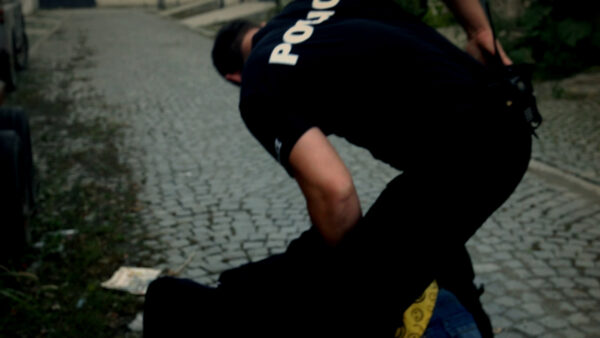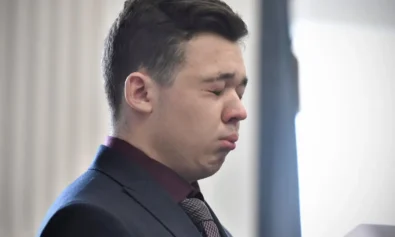A Louisiana man was falsely accused of using crack cocaine and violently arrested by police, a lawsuit obtained by Atlanta Black Star alleges.
Alexander Clark, 67, a Black man, said he had stopped for gas in Livingston Parish when he was pulled over by law enforcement officers in May 2021.
He had just finished sheetrocking and painting a friend’s home and was covered in drywall residue, the complaint says. The officers searched Clark’s work truck without a warrant or his permission while repeatedly asking him, “Where’s the crack,” it further alleges.
An officer found an attachment piece for one of Clark’s work tools and accused him of using it to smoke crack, the federal complaint says. He was arrested for resisting arrest and failure to use a turn signal. The latter charge was dropped.

The encounter left the older man with fractured bones and torn ligaments in his right arm and right hand and unable to work. Clark’s attorneys said the officers violated Clark’s constitutional rights and used excessive force. Clark’s detainment was so unlawful that an officer who responded to an emergency call by a lawman already on the scene left when he arrived because he did not want to be involved, according to court documents.
Clark is suing Denham Springs, the city’s police department and three of its officers, the Livingston Parish sheriff and two Livingston Parish deputies for the part they played in his arrest. Clark and his lawyers said the incident is just one example of the racial profiling and overpolicing that occurs daily in Livingston Parish’s only Black neighborhood.
Social Justice Legal Foundation (SJLF) and ACLU of Louisiana took on the case on Clark’s behalf. They also seek to end the disproportionate treatment of Black residents in one of the state’s most segregated parishes with a history of Ku Klux Klan activity.
“The inhumane treatment, degrading comments, and pain the officers inflicted on Mr. Clark, a pillar of his community, are a poignant example of what it means to simply exist as a Black individual in Livingston Parish,” Social Justice Legal Foundation fellow Alyssa Martinez said.
Clark grew up in the neighborhood in the suburban and rural parish east of Baton Rouge. The community is a small section in Denham Springs. It was the home of the all-Black West Livingston High School before Clark and a group of other students were court-ordered to desegregate Denham Springs High School in 1969.
More than 90 percent of Livingston Parish’s population is white, and only 7.1 percent is Black.
A star athlete in high school, Clark was the first Black baseball player at Southeastern Louisiana University, where he led the team to a College World Series. He spent three years playing professional football in Canada before returning to Louisiana to work as a football coach. He is also a residential and commercial sheet rocker and painter.
Clark no longer lives in the neighborhood, but he often visits to spend time with his 11 siblings and extended family. He is also known in the neighborhood for hosting community events.
On May 24, 2021, Clark spent over 16 hours putting up drywall in a lifelong friend’s house as a birthday surprise. He stopped at a local gas station on the route home but realized soon after that it was closed. Clark was pulled over by Livington Parish Sheriff’s Deputy Jean Hotard as he exited the gas station around 11:30 p.m.
The deputy wrote in his report that Clark “failed to use a blinker.” His lawyers allege he used his turn signal before and after each turn.
Hotard asked Clark for his license and registration, and the man complied. However, the deputy did not take them right away. Instead, he took out his flashlight and flashed it around Clark’s truck.
Hotard wrote in his report that he “detected the obvious odor of marijuana emitting from” the vehicle and spotted “an unlabeled bottle of pills sitting in the cupholder.”
Clark told Hotard that the pills were, as labeled, Allopurinol, prescribed for his gout and joint pain. Hotard and another deputy, Calvin Bowden, rummaged through the man’s truck even though Clark told them to get a warrant first.
“Where’s the crack at?” Bowden allegedly asked over and over.
The lawsuit alleges that Clark sat on the back of his truck with his personal documents as directed and complied with all of the deputies’ orders.
“There was no apparent odor, no visible incriminate object, and no sound in or nearby Mr. Clark’s truck that would indicate illegal activity,” the complaint says.
The deputies also ordered Clark to remove his shoes and socks before finally taking his license and registration from him and heading back to the first police cruiser. They called for backup, reporting that an officer was in distress. At some point, at least three Denham Springs Police officers responded to the call.

Bowden found a Quick Connect compressor attachment piece among Clark’s other tools in his truck. It is used in drywalling as part of the air compressor system for spraying wall texture. Bowden concluded, however, that it was a crack pipe.
Hotard and Bowden also held up a $20 bill Clark had produced when ordered to empty his pockets and demanded that he “own up to whatever fell out” of it. When nothing fell out, the deputies “appeared surprised,” the lawsuit alleges. As Clark reached to get his money back Hotard grabbed the older man’s right arm, and Bowden grabbed his left arm without any verbal indication that he was under arrest, court documents show.
According to the complaint, the two deputies in their 20s pulled Clark’s arm “forcefully behind his back, twisting them upward and back, while pushing his lower body into the bed of his truck.”
“These actions put intense pressure on Mr. Clark’s hands and wrists,” the complaint says. He also accused Denham Springs Officer Sydney McCullough of pressing down on his neck during the arrest.
Hotard reportedly apologized to Clark for how he was treated during the drive to the parish jail.
Multiple MRIs revealed the injuries to Clark’s limbs. The lawsuit alleges that he had severe swelling in his right hand after the encounter and was unable to close his fist. The deputies also exacerbated damage to Clark’s hip, the lawsuit alleges, leaving him with severe pain. He could not sit or stand comfortably for six weeks.
Clark had surgery in March to treat the inquires to his arm, and he now has a scar from the medical procedure. He is seeking compensation for harm caused by his arrest, including anxiety and lost work.
Clark wants law enforcement and the city held accountable for what they did to him and the targeted policing of his childhood home. He wants the court to declare that the deputies and officers’ actions violated the U.S. and Louisiana constitutions and that the sheriff neglected to “screen, supervise, investigate and discipline” his deputies.
Clark is also asking for an order preventing law enforcement from racially profiling people who visit and live in the Black neighborhood. Many residents of the neighborhood are reportedly older or elderly people.
“My dad always said, right is right. And what happened to me just ain’t right. I want justice for me and for my community,” he said in a statement.
Despite Livingston Parish’s low percentage of Black residents, reports show that Black people make up more than 20 percent of the population in the parish jail. It has one of the highest overrepresentations of Black people in its jail in the state, Clark’s attorneys said.
They added that neighboring areas have a higher prevalence of drug crime but do not see the same level of policing as the Black community.
“LPSO’s disproportionate ticketing and policing of the neighborhood cannot be explained by chance or neutral factors,” they wrote. “The neighborhood has neither the densest population, busiest traffic, nor the highest incidents of crimes committed within either Denham Springs or Livingston Parish.”
When Clark was in his 20s and 30s, Black residents were subjected to a heavy Klan presence in Denham Springs.
The Klan hosted rallies in the city as late as 1975, when speakers “spewed racial slurs and at times advocated outright violence, with David Duke instructing attendees to ‘Get your guns,'” the lawsuit alleges.
Breakaway Klan faction Southern Knights had its headquarters in Denham Springs from 1975 to 1984. The sect had a reputation as one of the most “violent” and “dangerous” Klan movements, according to the FBI. Newly emerged KKK branches have been reported in Livingston Parish as recently as 2008.


